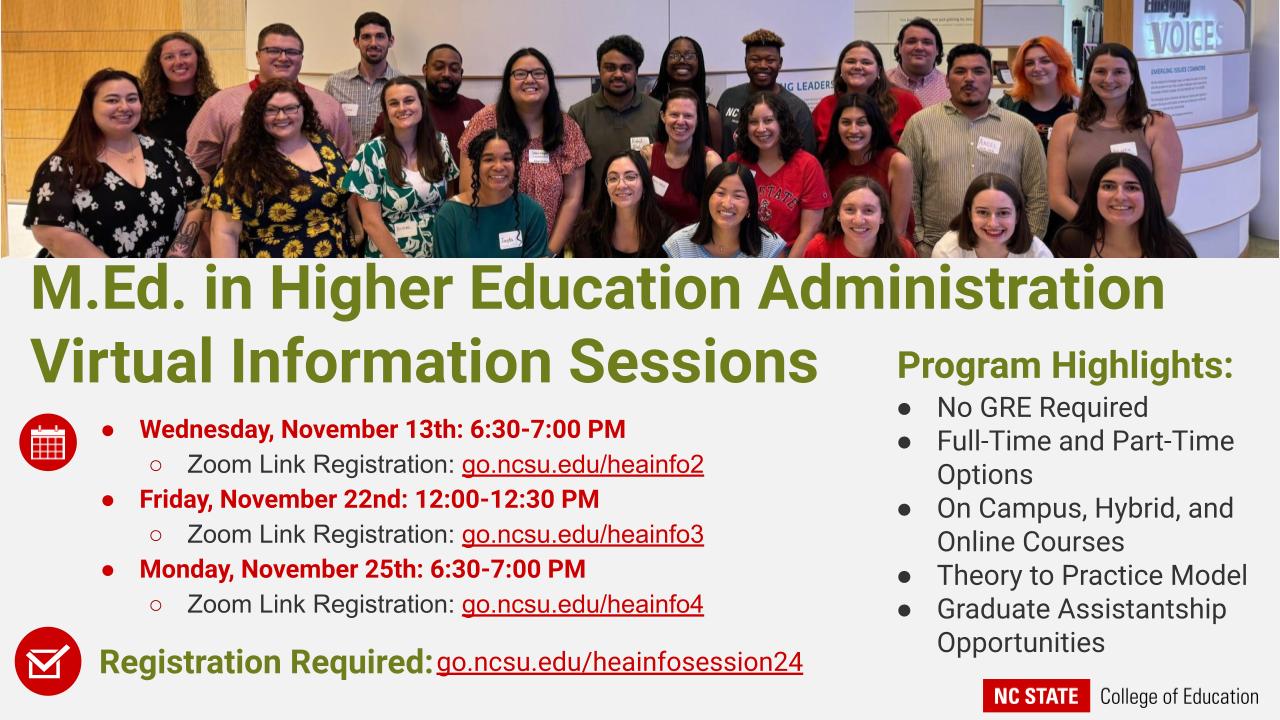Program Description
NC State’s Higher Education program provides exceptional opportunities for students interested in higher education administration to explore a core body of knowledge, gain real-world professional experience and pursue advanced study. Program content is informed by relevant theory, scholarly research and best practice in the fields of higher education and student affairs. In addition, the program links theoretical foundations of higher education leadership and administration to practical application of skills.
As a student in our program, you will develop the professional expertise required for entry or advancement in colleges and universities, governmental agencies or public service organizations.
By participating in this master’s program, you will benefit from several distinct program characteristics:
- Diverse students and faculty representing a variety of backgrounds, experiences and research interests
- A commitment to educational opportunity
- Access to multiple institutional types in the Triangle area that provide diverse contexts for learning and professional development
Request More Information
join us for these other opportunities to learn more about our program.
Learning Outcomes
Students who complete the Master of Education in Higher Education Administration at NC State will be able to:
- Articulate a personal philosophy of student affairs and/or higher education grounded in critical self-reflection about one’s role as a professional in the field.
- Understand and apply ethical principles, core values, and standards of practice endorsed by the higher education and student affairs profession.
- Explain the importance of advocacy as it relates to ethical practice in student affairs, and enact an ethic of care in professional contexts.
- Demonstrate a nuanced understanding of the array of professional roles, functions, and activities that exist within higher education and student affairs.
- Develop critical thinking, research, and analytical skills necessary to be critical consumers of higher education literature and integrate course-based knowledge to address issues facing students and leaders in higher education.
- Critically evaluate historical events and current issues relevant to higher education and the student affairs profession and articulate their impact on individuals and institutions.
- Design and evaluate effective educational interventions informed by: (a) current higher education and student affairs literature, (b) professional standards and best practices, and (c) understanding the basics of qualitative and quantitative research and assessment designs.
- Exhibit leadership within the realm of higher education and student affairs administration by applying knowledge in leadership, management, and management practices.
- Produce an actionable professional development plan that reflects involvement in higher education and student affairs at the institutional, regional, national and/or international level.
- Develop and refine academic/professional communication and presentation skills, including written, verbal, non-verbal, and digital.
#19
ranked in the nation in higher education administration specialty category in the 2025 U.S. News’ Best Graduate Schools
Admission Requirements
- Personal statement of interest and desired career goals. Statement should be written in essay format, be no more than 500 words, and address the following questions:
- Why do you want to pursue a master’s in Higher Education at NC State?
- What are your career interests and goals?
- What unique contributions or special interests do you bring to the field of higher education?
- Professional resume or CV
- Transcripts from all institutions attended (except NC State)
- Three professional/academic recommendations
- TOEFL or IELTS scores for international students
- The GRE is not required.
Course of Study
At 36 credit hours, typically the Master of Education (M.Ed.) in Higher Education Administration degree takes 2–3 years to complete, depending on enrollment status.
Curriculum
Course descriptions can be found in the university course catalog.
The following courses comprise the required academic core of the M.Ed. degree program and the chart serves as a suggestion for the course sequence in order to meet the core requirements if you are enrolled as a full-time student expecting to complete the program in two years. In combination with the 12 hours of appropriate electives, they constitute a master’s curriculum of 36 semester hours.
Higher Education Core (24 hours)
- EAC 540 Foundations of Higher Education and Student Affairs (3 hours)
- EAC 542 The College Environment (3 hours)
- EAC 543 Student Development Theory (3 hours)
- EAC 545 Higher Education Master’s Professional Seminar (Capstone – 3 hours)
- EAC 595 Diversity in Higher Education (3 hours)
- EAC 595 College Outcomes (3 hours)
- Research Component
- EAC 595 Research and Assessment in Higher Education (3 hours)
- Experiential (Internship / Practicum) Component
- EAC 651 Internship in Adult and Community College (3 hours)
Higher Education Threads
The NC State M.Ed. program allows students to enroll in 12 semester hours of graduate-level electives that allow for personal exploration of and exposure to specific areas of professional interest, while fulfilling the 36 semester hours required for completion of the master’s degree. The ‘threads’ below will allow students to have a focus for their electives and delve deeper into one specific area. Specific courses are recommended and outlined in the student handbook that will assist students in developing knowledge, skills, and abilities in that area.
- College Student Affairs
- Higher Education Organization and Administration
- Qualitative Research Methodology
- Institutional Research
- Counselor Education
- Training and Development
- Community College Leadership
- Public Policy
Graduate Assistantship Information
As a community, we value engaging in effective educational practice, and our students enact this value through coursework, graduate assistantships, internships, and professional development opportunities.
Supervised practice experiences within our Higher Education program take several forms: (1) graduate assistantships, (2) required internship, and (3) independent studies. Graduate assistantships are paid opportunities for part-time employment (15-20 hours per week) and are generally contracted for a minimum of an academic year. The required internship is a short term experience that takes place during the fall of the second year and is accompanied with an in-class academic component (3 credit hours) and may or may not be paid. Lastly, students are encouraged—and the majority of the students take advantage of the opportunity—to complete an additional internship experience for academic credit as an independent study. Many of these opportunities are made possible through our strong partnership with the Division of Academic and Student Affairs at NC State.
Students in the Higher Education Administration (M.Ed.) program are not required to hold a graduate assistantship; however, most of our full-time students are interested and able to secure assistantships to help fund their graduate education while gaining valuable practical skills. There is not a separate application for obtaining a graduate assistantship; the Higher Education program assists in the matching process for students in the Master’s program. Each year, we host an annual spring Recruitment Weekend where students are able to interview for various assistantship and employment opportunities that will be available during the following academic year. Assistantship/Employment contracts, tuition remission, and stipend amounts vary based upon the position and institution. In addition to assistantships at NC State, our program has longstanding partnerships with both Duke University and University of North Carolina at Chapel Hill, and in the past, we have had assistantships at North Carolina Central University and Meredith College. Below are a sampling of assistantships currently held by our students:
- University Housing (NC State)
- Center for Student Leadership, Ethics, and Public Service (CSLEPS) (NC State)
- Fraternity & Sorority Life (Duke)
- Health & Wellness (Duke)
- New Student & Parent Programs (UNC-Chapel Hill)
- Poole College of Management (NC State)
- Sophomore Year Experience (Duke)
- Talley Student Union (NC State)
- Office of Student Involvement (NC State)
- Goodnight Scholars Program (NC State)
- International Student Services (NC State)
- Residence Life (Duke)
- Student Activities (Duke)
Links
Professional Associations:
Our Faculty
Krispin Barr
Assistant Teaching Professor of Higher Education
kwbarr@ncsu.edu
David English
Associate Teaching Professor
djenglis@ncsu.edu
Joy Gaston Gayles
Professor and Department Head, ELPHD
joy_gayles@ncsu.edu
Keon McGuire
Associate Professor of Higher Education Opportunity, Equity, and Justice
kmmcgui3@ncsu.edu
Alyssa Rockenbach
Professor & Alumni Distinguished Graduate Professor
alyssa_rockenbach@ncsu.edu
Doneka Scott
Professor of Practice
Vice Chancellor and Dean for the Division of Academic and Student Affairs
doneka@ncsu.edu
Roshaunda Breeden
Assistant Professor of Higher Education Opportunity, Equity, and Justice
r_breeden@ncsu.edu
Sue Wasiolek
Adjunct Associate Teaching Professor
sjwasiol@ncsu.edu
Jai Jackson
Adjunct Teaching Professor
mjjacks6@ncsu.edu



